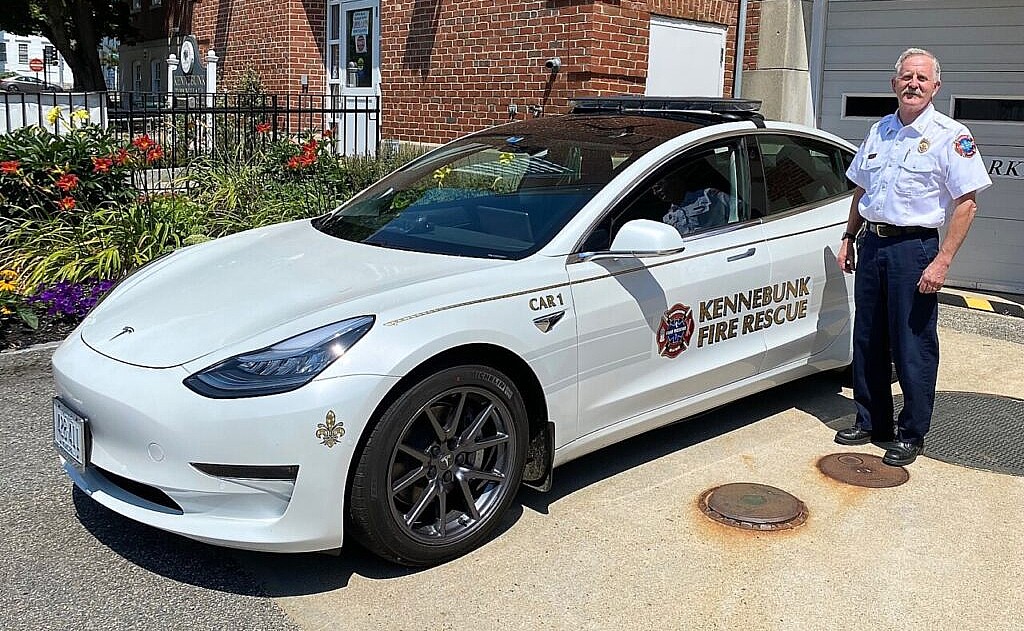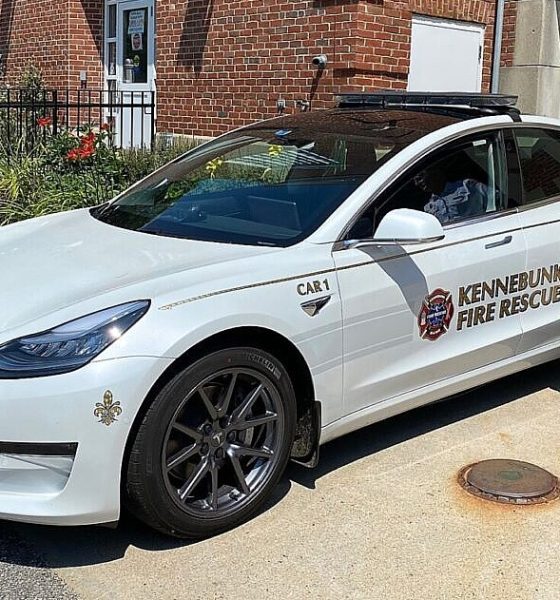

News
Tesla Model 3 selected over Chevy Tahoe as fire chief’s new command vehicle
With the Tesla Model 3 proving itself as a viable alternative to gas-guzzling police vehicles across the globe, it appears that other key organizations such as fire departments are now looking to utilize the all-electric sedan for their operations. Among the most recent places to do this was Kennebunk, Maine, which recently revealed that it has acquired a Model 3 as a command vehicle for the city’s fire chief.
Interestingly enough, Kennebunk Fire Department Chief Jeff Rowe had been looking to acquire a Chevy Tahoe as his next command vehicle when he heard a presentation at the local Rotary Club about the effects of environmental changes. Kennebunk already has committed to energy efficiency, being one of the signatories of the Global Covenant of Mayors for Climate and Energy. Other vehicles were then considered, including the Model 3 itself.
Some say it's mystic….It's electric Boogie woogie, woogie! Way to go Chief Rowe! #marciagriffithsPosted by Kennebunkport Fire Department on Friday, August 7, 2020
However, the Model 3 was more expensive than the Tahoe, and it was above Efficiency Maine’s ceiling, which would have given the vehicle a $7,500 incentive. But it appears that Rowe was really set to drive an electric car, as a Tesla representative later contacted the fire chief about the Model 3’s options. As it turned out, if the fire department ordered a variant with a base white color, the all-electric sedan could meet the threshold for the state’s incentives.
The Kennebunk Fire Department ultimately acquired a Model 3 Dual-Motor AWD variant. The purchase ultimately cost $41,490 including the $7,500 state incentive. This made the Model 3 only $2,000 more than a Chevy Tahoe, and that difference is easily leveled out by the all-electric car’s gas savings. Rowe drives about 9,000 to 10,000 miles annually, after all, which translates to about $1,500 a year on gas. The Model 3, on the other hand, is expected to raise the fire department’s electric bill by $30 per month, which translates to about $360 per year.
For now, the Tesla Model 3 command unit is being used primarily by Rowe, as well as other fire department personnel. It’s used for traveling to inspections, fire calls, related meetings, and out-of-town events. The department is also building a slide-out office at the rear trunk of the Model 3 as a command center of sorts where the chief could keep track of updates at fire scenes. The Model 3’s command center is smaller than those found in SUVs, Rowe noted, though it was quite comparable to the Ford Crown Victorias that were used by the department before.
In a press release, Rowe noted that his transition to the Model 3 actually proved to be quite smooth. There are charging stations in the city, and a Level 2 charger had been installed at the fire department. According to the chief, he typically plugs in the Model 3 when he arrives at work in the morning, and the vehicle is usually fully-charged by noon. He also mentioned that the Model 3 behaves quite nicely on the road, since there’s no wait or hesitation when he presses on the accelerator. There’s just the rush of instant torque propelling the Dual-Motor AWD Model 3 from 0-60 mph in 4.4 seconds.

News
Tesla ships out update that brings massive change to two big features
“This change only updates the name of certain features and text in your vehicle,” the company wrote in Release Notes for the update, “and does not change the way your features behave.”

Tesla has shipped out an update for its vehicles that was caused specifically by a California lawsuit that threatened the company’s ability to sell cars because of how it named its driver assistance suite.
Tesla shipped out Software Update 2026.2.9 starting last week; we received it already, and it only brings a few minor changes, mostly related to how things are referenced.
“This change only updates the name of certain features and text in your vehicle,” the company wrote in Release Notes for the update, “and does not change the way your features behave.”
The following changes came to Tesla vehicles in the update:
- Navigate on Autopilot has now been renamed to Navigate on Autosteer
- FSD Computer has been renamed to AI Computer
Tesla faced a 30-day sales suspension in California after the state’s Department of Motor Vehicles stated the company had to come into compliance regarding the marketing of its automated driving features.
The agency confirmed on February 18 that it had taken a “corrective action” to resolve the issue. That corrective action was renaming certain parts of its ADAS.
Tesla discontinued its standalone Autopilot offering in January and ramped up the marketing of Full Self-Driving Supervised. Tesla had said on X that the issue with naming “was a ‘consumer protection’ order about the use of the term ‘Autopilot’ in a case where not one single customer came forward to say there’s a problem.”
This was a “consumer protection” order about the use of the term “Autopilot” in a case where not one single customer came forward to say there’s a problem.
Sales in California will continue uninterrupted.
— Tesla North America (@tesla_na) December 17, 2025
It is now compliant with the wishes of the California DMV, and we’re all dealing with it now.
This was the first primary dispute over the terminology of Full Self-Driving, but it has undergone some scrutiny at the federal level, as some government officials have claimed the suite has “deceptive” names. Previous Transportation Secretary Pete Buttigieg was one of those federal-level employees who had an issue with the names “Autopilot” and “Full Self-Driving.”
Tesla sued the California DMV over the ruling last week.
News
Tesla workers push back against Giga Berlin unionization
“IG Metall did not succeed in Giga Berlin‘s works council election earlier today. The union share was reduced from nearly 40% in 2024 to 31% in 2026! This is a clear message by the Giga Berlin team towards an independent co-determination! The list called Giga United, led by the current chairwoman, Michaela Schmitz, received the most votes with more than 40%! Good news for Giga Berlin!”

Tesla workers pushed back against unionization efforts at Gigafactory Berlin, and over the past few years, there has been a dramatic decrease in interest to unionize at the German plant.
Gigafactory Berlin Plant Manager André Thierig announced on Wednesday that IG Metall, the European union group, saw its share reduce from 40 to 31 percent in 2026 as employees eligible to vote on the issue. Instead, the Giga Berlin team, known as Giga United, received the most votes with more than 40 percent.
BREAKING! 🚨
IG Metall did not succeed in Giga Berlin‘s works council election earlier today. The union share was reduced from nearly 40% in 2024 to 31% in 2026!
This is a clear message by theGiga Berlin team towards an independent co-determination!
The list called Giga…
— André Thierig (@AndrThie) March 4, 2026
Thierig gave specific details in a post on X:
“IG Metall did not succeed in Giga Berlin‘s works council election earlier today. The union share was reduced from nearly 40% in 2024 to 31% in 2026! This is a clear message by the Giga Berlin team towards an independent co-determination! The list called Giga United, led by the current chairwoman, Michaela Schmitz, received the most votes with more than 40%! Good news for Giga Berlin!”
There were over 10,700 total employees who were eligible to vote, with 87 percent of them turning out to cast what they wanted. There were three key outcomes: Giga United, IG Metall, and other notable groups, with the most popular being the Polish Initiative.
The 37-seat council remains dominated by non-unionized representatives, preserving Giga Berlin as Germany’s only major auto plant without a collective bargaining agreement.
Thierig and Tesla framed the outcome as employee support for an “independent, flexible, and unbureaucratic” future, enabling acceleration on projects like potential expansions or new models. IG Metall expressed disappointment, accusing management of intimidation tactics and an “unfair” campaign.
The first election of this nature happened back in 2022. In 2024, IG Metall emerged as the largest single faction with 39.4 percent, but non-union lists coalesced for a majority.
But this year was different. There was some extra tension at Giga Berlin this year, as just two weeks ago, an IG Metall rep was accused by Tesla of secretly recording a council meeting. The group countersued for defamation.
Tesla Giga Berlin plant manager faces defamation probe after IG Metall union complaint
This result from the 2026 vote reinforced Tesla’s model of direct employee-management alignment over traditional German union structures, amid ongoing debates about working conditions. IG Metall views it as a setback but continues advocacy. Tesla sees it as validation of its approach in a competitive EV market.
This outcome may influence future labor dynamics at Giga Berlin, including any revival of expansion plans or product lines, which Musk has talked about recently.
News
SpaceX President Gwynne Shotwell details xAI power pledge at White House event
The commitment was announced during an event with United States President Donald Trump.

SpaceX President Gwynne Shotwell stated that xAI will develop 1.2 gigawatts of power at its Memphis-area AI supercomputer site as part of the White House’s new “Ratepayer Protection Pledge.”
The commitment was announced during an event with United States President Donald Trump.
During the White House event, Shotwell stated that xAI’s AI data center near Memphis would include a major energy installation designed to support the facility’s power needs.
“As you know, xAI builds huge supercomputers and data centers and we build them fast. Currently, we’re building one on the Tennessee-Mississippi state line. As part of today’s commitment, we will take extensive additional steps to continue to reduce the costs of electricity for our neighbors…
“xAI will therefore commit to develop 1.2 GW of power as our supercomputer’s primary power source. That will be for every additional data center as well. We will expand what is already the largest global Megapack power installation in the world,” Shotwell said.
She added that the system would provide significant backup power capacity.
“The installation will provide enough backup power to power the city of Memphis, and more than sufficient energy to power the town of Southaven, Mississippi where the data center resides. We will build new substations and invest in electrical infrastructure to provide stability to the area’s grid.”
Shotwell also noted that xAI will be supporting the area’s water supply as well.
“We haven’t talked about it yet, but this is actually quite important. We will build state-of-the-art water recycling plants that will protect approximately 4.7 billion gallons of water from the Memphis aquifer each year. And we will employ thousands of American workers from around the city of Memphis on both sides of the TN-MS border,” she noted.
The Ratepayer Protection Pledge was introduced as part of the federal government’s effort to address concerns about rising electricity costs tied to large AI data centers, as noted in an Insider report. Under the agreement, companies developing major AI infrastructure projects committed to covering their own power generation needs and avoiding additional costs for local ratepayers.








